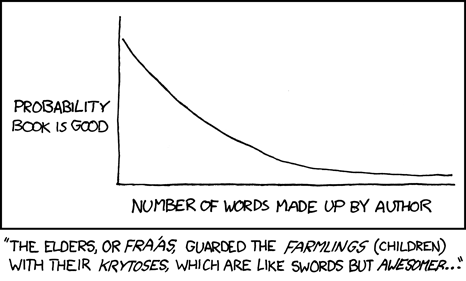
When I saw this xkcd strip (distributed under a Creative Commons license - attribution, non-commercial - yay!) first I laughed, then I cried. Why did I laugh? Because he's right. I think we've all read that book. You know, that book. The one where everything and its cousin has some inane made-up term and you find yourself constantly flipping to the glossary in the back of the book for reference because you can't figure out what the hell is going on.
For that matter, I think we've all played that roleplaying game, too. The one where the authors saw fit to include a massive lexicon of made up slang terms in the back (I'm looking at you, Planescape, Shadowrun) (also, they're converting Planescape to the Mage: the Ascension rules set? Awesome! I'll have to investigate that later). I mean, do they expect us to actually memorize that list and use it in play?
In both of these negative archetypes, the problem is one of usage. The trouble is that nobody really cares. We don't want to have to flip back and forth between the text of the novel and a glossary in the back of the book. We don't want to memorize five pages of made up slang to play our characters. We want to read. We want to play. We want to get to the good stuff already.
It's also a problem of consistency and suspension of disbelief. You see, with most books, there is an assumption that the characters aren't really speaking English (or whatever). Why should they be? They're elves, or aliens, or superficially human creatures living in a world with radically different geology and physical laws. So then, the question becomes, why does the author translate so selectively? If you're going to leave a word that translates as "oh, crap!" in whatever weird language they speak in your fictional world, why not write the entire book in Sblurbish and provide a translation guide in the back? Where do you draw the line, and why?
Ok, maybe that last one doesn't bother anyone else. Me, it keeps up at night. Go figure.
Anyway, after I laughed, I cried. Why? Because you know what? I've written that book.
In A Knight of the Land I spent a lot of time and energy creating an ancient language, which I called Keashonite. I wanted to give the Knights of the Land an anachronistic feel, like they were not quite in sync with the world around them. They were an ancient order, following ancient rules, and still reeling from the aftereffects of an old war. So, I gave them an old language. The Knights named their swords and horses in this old language.
The two things that (I hope) set A Knight of the Land apart from those books are this: selectivity and consistency. I was very careful about where I use Keashonite in A Knight of the Land. Not everyone spoke it and even the Knights didn't spew it left and right. Instead, the Knights used Keashonite for things that didn't have proper words in their modern language, in communication with creatures that didn't speak more modern languages very well, and as the proper names of the occasioanal person, creature, and thing. Secondly, I applied Keashonite consistantly and wove it into the entire setting. Lots of nations and landmarks have Keashonite-sounding names (most of which I never bothered to go into), just to provide a feeling that these weird words are a part of the setting at large, not just me making shit up.
But sometimes, I'm afraid that at worst, I'm just perpetrating the same sort of narrative asshattery that I just finished mocking, only with a length justification. At best, I'm afraid that I'll be tarred with the same brush. The fantasy world is saturated with made up lingo, and whatever I do, I'll come across as stupid.
Or maybe I won't. There's only one way to find out: finish editing the damned thing and start sending it to agents.
And that's it for Friday. I'll see you all again on monday. Until then, iko kee'an meresh, friends.
* * *
- Are there any particularly egregious made up word heavy novels and roleplaying games that I missed?
- Have you ever written a story heavy with made up words? How did it go?
1 comment:
What about Tolkien? He created some 15 languages. Some are being spoken by fans. Also Kilngonese is also very popular too.
Post a Comment